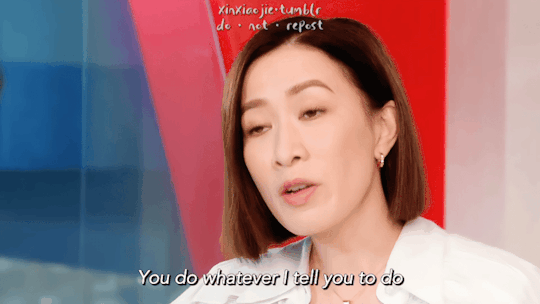Text
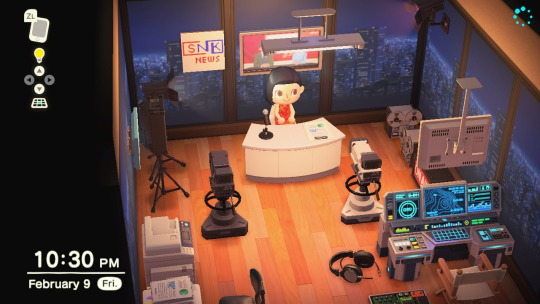



歡迎收睇Prime Time News
3 notes
·
View notes
Text


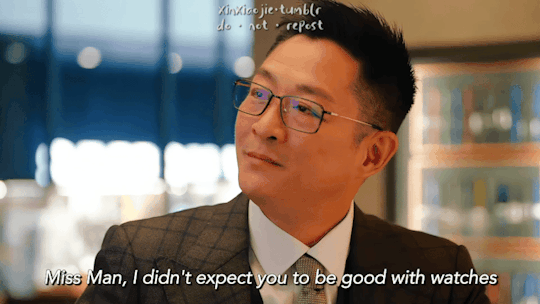
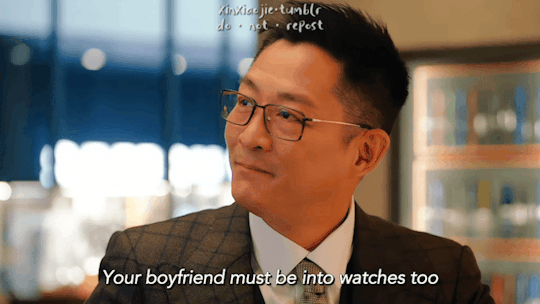






- A'Man, new watch? It's pretty, it suits you. While it's pretty there is nothing technical about fashion watches.
新聞女王 The Queen of News · 2023
32 notes
·
View notes
Text
I know nobody knows what the fuck I'm saying 90% of the time but tonight's episode of the queen of news so good... I thought it was very TOUCHING. It basically talked about how our female lead rose to power and all the sacrifices she made in order to do so. her dialogue basically went like "If I could choose differently, I would've quit my job and moved away with (my boyfriend), but there's no what if's in this world. a chance appeared in the night sky like lightning, I caught it in the moment and everything changed. I rose higher, while (my boyfriend) fell deeper. I received all the presents, but it was he who had to pay for it. everything I have now, I've traded it with both our souls so I'll never see it go to waste. not now, not ever." I know out of context this makes no sense but she was a journalist that caught a once in a lifetime crime scene that essentially propelled her career forward, but in the midst of recording, her cameraman, who was also her boyfriend got shot. It was just good ma'am... her monologue, the way she expresses her love for boyfriend, and acknowledgement that he took the brunt of the matter. maybe I shatttttttttt 😭
6 notes
·
View notes
Text
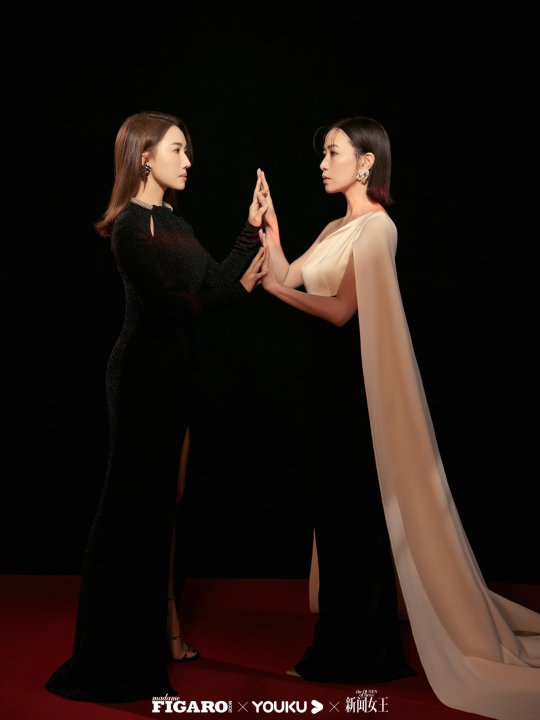
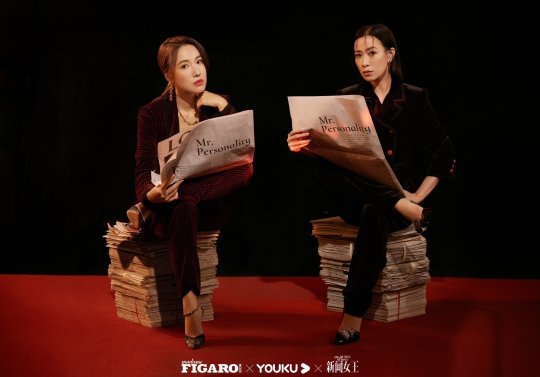

The Queen Of News’ Charmaine Sheh and Selena Lee for Madame Figaro China x Youku
6 notes
·
View notes
Text

found the similarities between my two hyperfixations
0 notes
Text
The Queen of News - Review
The Queen of News recently swept the TVB awards (well-deserved), namely Charmaine Sheh's 3-time best actress in 3 different areas for this role. Her acting is subtle at times but chillingly good, conveying something with the smallest eye twitch. I went back to really rewatch it in depth and wow I'm just obsessed and blown away at how good it is. I forgot how damn good dramas can be when they're serious about the production and having a thoughtful creative process. There are a number of things that I want to talk about, so where do I start?
The Women
This drama is women-centric, with its 5 main women as some of the most 3-dimensional, complex, morally-grey characters that I've seen in a while. It's easy to make a shallow drama with women fighting (usually over men), with some typical "women are catty" misogynistic tropes. Though this show doesn't have a female director I'm glad it still handled the women's storylines well in my opinion. They're women doing some awful, questionable, morally grey things in the name of news, in the name of the truth, or in the name of gaining power. You end up gaining sympathy for them nonetheless.
You have the queen herself, Man Wai Sum "Man Tse" (Charmaine Sheh), who's at the top now and she's a tough girlboss, using everyone around her as chess pieces, but you come to find out that she too has weak spots and vulnerabilities. She also has regrets, she wasn't born with a silver spoon in her mouth. She had to lose a part of her soul in exchange for her spot, in a very Faustian way actually.
Cheung Ka Yin (Selena Lee) is a very very interesting character. In the beginning she's the only one with morals, a heart, and real news in her best interest. She's stubborn but resilient in her beliefs, but you watch as her hope in Man Tse and humanity in general, dwindles over time, until it reaches a breaking point. When she snaps, she becomes a different person and she's had enough. I was fully rooting for her up until the incident with Slash (Mark Ma), but that’s the whole point. None of these characters are fully good or evil, and that’s what keeps them interesting.
I didn't find the character of Cathy Hui very compelling personally, but that’s just me. She’s also devious, starting out in George (Kenneth Ma)’s side, before switching over to Man Tse’s team. The audience is pretty much made to hate her until we gain a little sympathy when we find out that she does all these things to be Prime Time host, not for fame but so her dad with worsening dementia can remember her again. She’s a woman who is portrayed to feel comfortable with her sexuality and uses it to her advantage, and that’s liberating for her. Good for her.
I ended up having the most sympathy for Tsui Hiu Mei (Regina Ho), not just because of her mental illness but come on that girl went through so much trauma on the show. Loyalty is supposed to be her forté, but she's also the most treacherous, playing both sides. At the end of the day she just wanted to feel useful, as that gave her purpose in life. She grew up poor and wanted a better way of life, but the system is rigged so she had to cheat the system, and can anyone blame her?
The only character who might actually be “good”, is Lau Yim (Venus Wong). She’s the fresh faced newbie who Ka Yin takes under her wing, and she may be “Stupid” but she has a fierce passion, she’s headstrong, and remains just despite how bad it gets around her.
Of course, there’s also other supporting female characters like the ever mighty Mrs. Fong (Mimi Kung) who is the real queen of the game, the only woman who can make Man Tse tremble. Then, there’s Wa Tse (Stephanie Che), a has-been, a woman who once was in a high position but gave it up for the sake of family and children, and now struggles to keep up with the times.
There’s compelling though maybe shallow surface-level explorations into questions of women balancing their careers with motherhood, and the role of being a wife whilst being a working woman.
The Women’s Relationships with Women
Watching this from a sapphic perspective, it’s really hard not to put a yuri spin onto these female relationships. Just look at the supertopics of the top 3 f/f ships on this show - Man/Yin , Man/Hiu Mei, Ka Yin/Lau Yim. Man Tse and Ka Yin are my favourite pairing, two very headstrong women and Ka Yin is probably the only one who could get near to Man’s level. When they collaborate, they work really well together, and have some great moments, like the volleyball case for example. Yet, they’re always in some argument because Ka Yin doesn’t agree with the way Man Tse works.
On the other hand, Hiu Mei is essentially Man Tse’s maid, she does everything she says even though she’s also kinda secretly dating George. Man Tse will tear her down and be the cause of her breakdown, and then also be the first one to comfort her. The toxic yuri potential is there. It’s even wilder to think that when Hiu Mei was attempting to end her life, she hallucinated Man Tse, who she took out her rage at and then eventually gave her a pep talk to continue to live strongly. Man Tse obviously cast a huge shadow over her life, and she’s sick of being her chess piece, but you can tell deep down Man cares about her.
Finally there’s Ka Yin and her mentee Lau Yim, who she’s slightly annoyed by at first but slowly grows to care about. They’re endearing to watch, and she gives her tough love. It’s a little like Man/Hiu Mei but not as toxic. She also does care about Lau Yim, but Lau Yim’s morals are in check, and she chooses not to blindly follow Ka Yin down an unethical path towards the end.
The Women’s Relationships with Men
It’s clear that this show centres the women’s relationship with other women, since the men in their life are very much background noise. She’s everything, he’s just… well. George is supposed to be Man Tse’s greatest opposition, but he’s not really all that threatening. Fei Ye (Eric Tang) is supposed to be an exec in a high position but is honestly pretty useless and has a non-threatening aura.
It’s interesting that Man, Ka Yin, and Cathy all have younger love interests. Man Tse has her situationship Ivan (Matthew Ho), a man who is much younger and her subordinate at work, plus she makes him leave her house by 11pm. It’s clear who’s in charge in the relationship. Her ex Kit (Shaun Tam) is a bit closer to her age, and honestly they were a really cute couple until that incident changed their lives forever, but in present day he’s still the only one that she can be herself around. He is the only one who Man is vulnerable, chill, and funny around, which I think is important to show that she also has a weaker side. Ka Yin’s romantic storyline is evidently about how she won’t succumb to patriarchal ideals of marriage, and throughout the series showed zero interest in her boyfriend-turned-fiancé-turned-ex Lawyer Siu played by Matthew Ko. She refused to quit her job and settle as a housewife, and she’s a modern feminist through and through. One line I remember is when she said “Women aren’t war trophies” ( 戰利品), it made me love her so much. Cathy also dates a much younger man, Wong Wai (Niklas Lam), who she also seems to be kind of playing with this feelings sometimes. He also has a super boyish and dorky look to him that really highlights their difference. I feel like these relationships are to show that the women are the ones in control for once.
The Themes
CW: Sexual assault
I was nervous to watch sexual assault storylines cause I didn’t know how the show would handle them. The first case with #MeToo called out for George was kind of iffy for me with how they handled Debbie (Judy Kwong)’s storyline. The incident kind of becoming a tool for Man Tse to do some manipulation made me worry it’d be bad for victims if they highlighted the false accusations too much, but I suppose they tried to show every side. It was a good segway into the volleyball team SA storyline, which I think was handled really well (surprisingly). Nicole Wu’s character voices the struggles of victims, about how no one believes them, not even their friends sometimes, the isolation, and why they’re afraid to speak up. Roxanne Ho’s character also shows that unfortunately sometimes even women aren’t stepping up for other women, until they become victims themself. The way Man Tse handled it despite being an old friend of the assailant also shows how sometimes people may know someone for many years, and swear “they’d never do something like that!” or “they never did anything to me, so that can’t be true” but still be wrong.
The rest of the themes and symbolism is quite self-explanatory and even on-the-nose sometimes. The constant Chess pieces, the Queen piece (I don’t play Chess but I suppose the point is that they’re the Queen), Hiu Mei referring to herself as Man’s chess piece, etc. Yes, they’re all making sneaky moves at each other, also shown in the many Mahjong scenes.
I feel like overall, this is a very excellent series. Of course, I went in with low expectations as I always do, and I understand that there are certain things they can’t really touch on. Nonetheless, a very well made series that I will be thinking about for a long time.
1 note
·
View note
Text

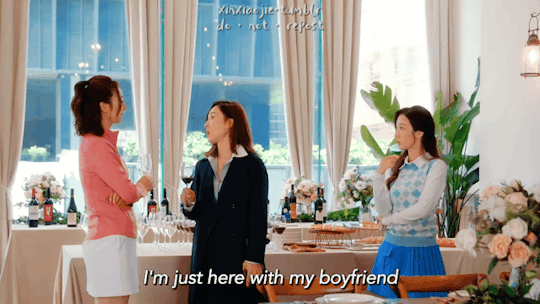
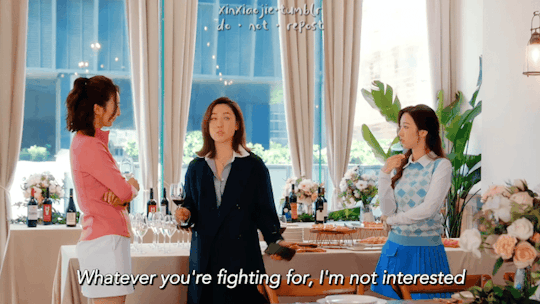
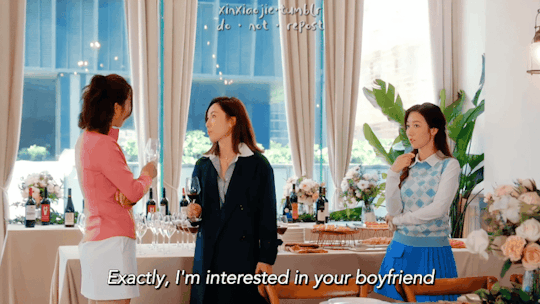




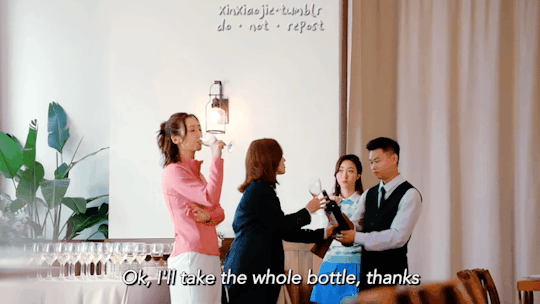
I'll take the whole bottle 🍷😇
新聞女王 The Queen of News · 2023
18 notes
·
View notes
Text

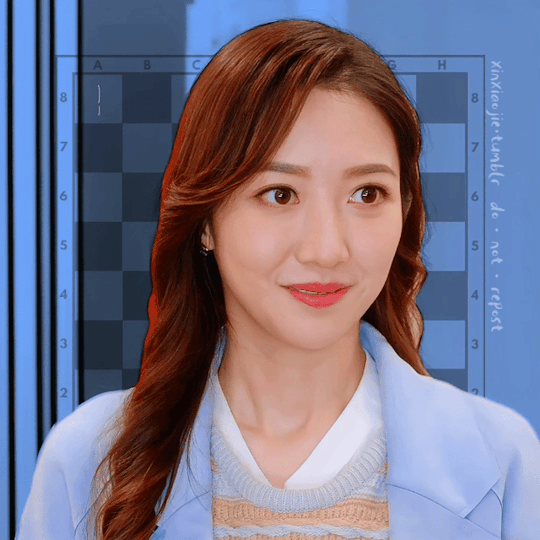
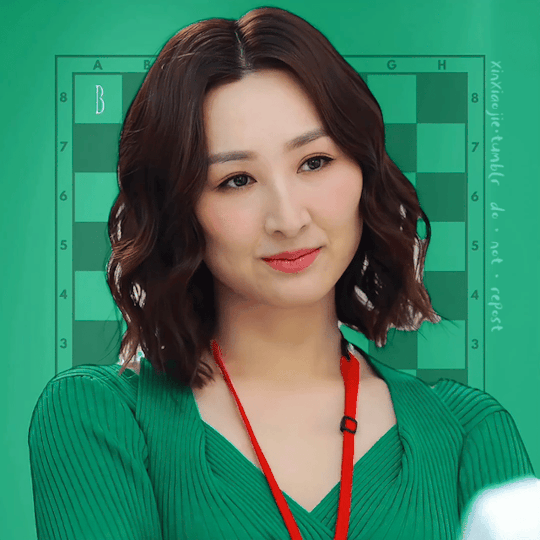

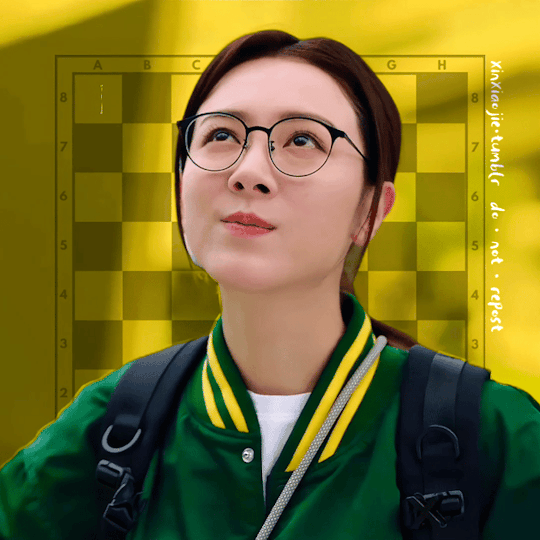
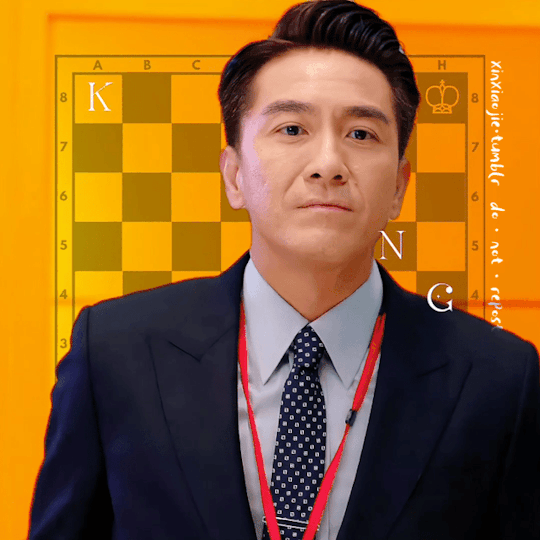
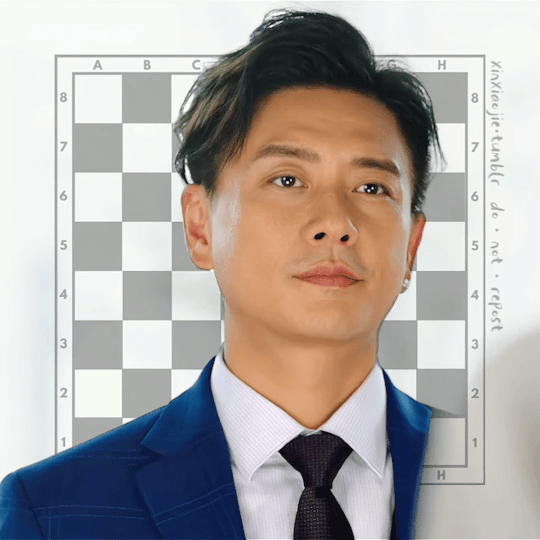
Man Wai Sam ♕ QUEEN ambitious, charismatic, leader
Chui Hiu Mei ♖ ROOK devoted, sensitive, efficient
Hui Si Ching / Cathy ♗ BISHOP cunning, outgoing, competitive
Jeung Ga Yin ♛ QUEEN curious, rational, creative
Lau Yim ♞ KNIGHT righteous, outgoing, focus
Leung Ging Yan / George ♟ KING PAWN paranoid, social, confident
Ku Siu Wa / Kingston ♚ KING? unknown
新聞女王 The Queen of News · 2023
32 notes
·
View notes
Text


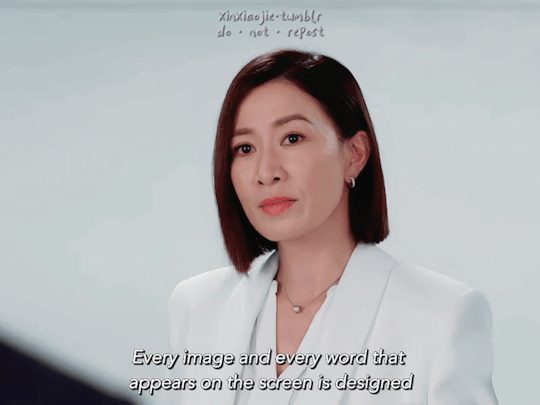
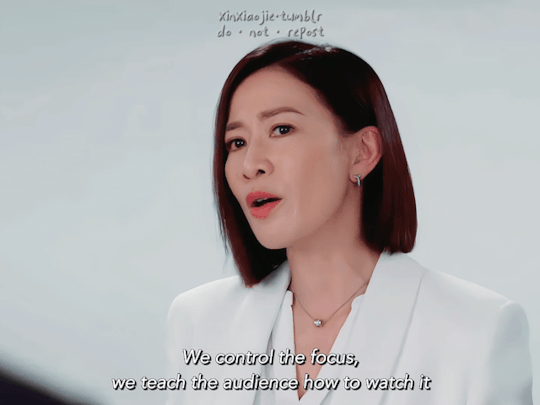


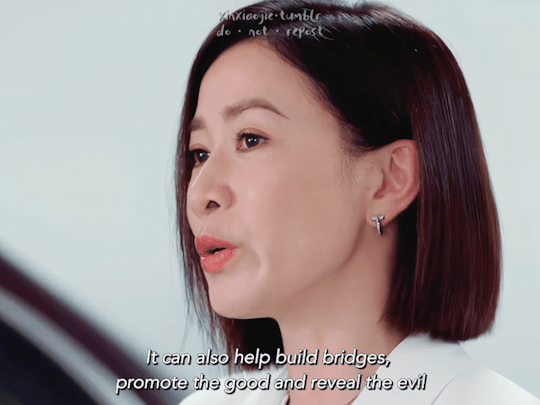
Can you distinguish what's true and what's false?
新聞女王 The Queen of News · 2023
61 notes
·
View notes
Text







Can you distinguish what's true and what's false?
新聞女王 The Queen of News · 2023
61 notes
·
View notes
Text
The 雙大 Lore Iceberg/ Masterpost

Here's the ongoing Iceberg if anyone cares. There's little things, little moments that I could list on forever as canonical evidence to Me that they're in love/soulmates, or just simply crazy things that I can't believe have happened to them. For example, the fact that no one on earth understands what Hung Sheung Sin is thinking, not even her boyfriend or her family, but Linda does. When they supposedly hate each other but Sheung Sin when put in a life-or-death situation they would die for each other. How is this canon but they're still denying that there's nothing between them. Okay let me get into this iceberg (no particular order). Some stuff not included in the iceberg
Tier 1
Calling each other 豈有此理 and 窮編劇, even setting it as their contact names, and every time they mention one another behind their backs at home
The n number of times they dressed the same (see: essay on doubling)
Linda paying Sheung Sin to write a reality show for her and her husband (and every time she needs someone to write something she goes to her tbh). Then Sheung Sin teachers her to give the audience the side of her that they want to see and perfectly captures her mean girlboss angle (we know that's her fantasy...) and then female netizens call her "husband" yeah Sheung Sin knows what the gays want
When they were trying to fight over who would have the better Mother's Day only to both end up in Thailand alone and then spent the night together on a date having dinner and taking pics for each other
In their first episode Sheung Sin goes back to save Linda and said "I promised I wouldn't leave you behind" and when Linda saved Sheung Sin in the hospital from a serial killer and also promised not to leave her behind
Every time Sheung Sin laughs at Linda when she's going through her misfortune
The Lung/Hung family lore goes deep, even their dads were childhood friends reunited, Mary Hung dated Max Lung, and Wind Lung had a crush on Hung Sum Yu. It's only logical that these two are also meant to be, right?
Their dogs were in love (more on the dog lore later)
The times when they held hands (probably while running from a serial killer)
Always being in the classic butting heads pose (à la Captain America: Civil War poster)
Being presidents of the Chung Tau fanclub together
Bailing out Terry and On Jai from the police station twice and generally using them as a weapon against each other
Giving Mrs. Tam a makeover together, and acting like gfs later
Sheung Sin giving Linda's brother Terry a crash course to winning arguments and how to gaslight
The fact that they're supposed to hate each other but Linda constantly admits and praises Sheung Sin's wits and intelligences, and acknowledges that she's the one who thinks of better plans
Everytime they act friendly for a moment and then immediately after they jump away in fake disgust and are like "You think we're close?"
Going to the Chung Tau concert together and forming a heart with their hands, then instantly bickering outside
Tier 2
They thought their dogs had sex/ had babies (they're dog in laws) but the Hung dog Bear Bear wasn't the father, so they faked a puppy funeral
Linda showing up at Sheung Sin's house begging her to be her volleyball coach and then working together to get Jenny
Linda losing a racecar to Sheung Sin in a bet but Sheung Sin was too proud to take it from her even though she secretly wanted it
Sheung Sin elbowing Linda's boob in front of press, and then slapping her ass at the photocall (all while dressed alike)
Watching Mission: Impossible - Dead Reckoning Part One together canonically (this is included cause it's one of my fav movies so it's hilarious to Me)
Sheung Sin working her son's shift at Linda's bar and then falling into her arms (heroic catching pose)
Sheung Sin keeping Linda's secret for her and didn't tell Mary when she asked
Linda cancelling a meeting just to speak with Sheung Sin (to her secretary's surprise)
Their dogs got dognapped together and they went to rescue them at a club (while dressed as teenagers)
Sheung Sin messing with Win and Linda getting defensive telling Sheung Sin not to mess with her (gay love triangle)
Sheung Sin helping Linda in the 2000th episode to take down Max
Sheung Sin messing with Linda, making fun of her bad singing and rooting for Terry to get to sing the theme song to spite her
Linda and Sheung Sin constantly comparing their boyfriends, Linda getting jealous that her brother likes Sheung Sin's bf more than her husband
That one time they glanced at each other across the room and nodded in silence
When Linda went to Sheung Sin's house just to get a glimpse of Chung Tau who was living across
Constantly fighting in washrooms (washrooms are gay)
Tier 3
Sheung Sin worrying about Linda's problem on Mid Autumn Festival and hung her lantern upside down because she was so preoccupied. She even begged her son to help Linda, something sh'ed never do.
Sheung Sin breaking into Linda's changing room and throwing out her clothes so she had nothing to change into, and Linda automatically assuming Sheung Sin wanted to fuck her
Sheung Sin replacing Linda as Terry's sister to piss her off and manipulating him into hating her
Also Sheung Sin staring at a picture of Linda when she's celebrating Mid Autumn Festival with her family and boyfriend.
Sheung Sin baiting Linda into spending all of her money out of spite
Two separate instances of Sheung Sin stripsearching Linda
Being Blonde Charlie's Angels spies in KC's dreamscape conducted by Sheung Sin's hypnotism
Getting kidnapped together x6?? and counting
Getting each other's eyebrows shaved off
When they went to an Onsen together in Japan and their hair turned grey and after a heart-to-heart bonding they tried to dye it back to black with seaweed (in which Sheung Sin makes sacrifices for Linda and leaves her the best ingredients), and later spend the night in a hotel room together, even their bf/husband the next morning were like "Where were you two last night..."
When Linda's husband's ex wife came back and the first thing she did was run to Sheung Sin to help her brainstorm "story ideas" to combat hypothetical ex-wives
Sheung Sin tripping Linda into a bowl of white powder so she can cosplay Guanyin at the temple
Tier 4
Asking each other to suck snake venom out when they got bit
Getting kidnapped by a crazy Chung Tau stan together and got tied up with ropes
Linda kidnapping Sheung Sin in the middle of the night to ask for her help
Linda randomly crushing on Sheung Sin's boyfriend after he saves her from a motorcycle accident (which turned out to be Sheung Sin's dad) but Sheung Sin uses this as an opportunity to mess with Linda instead of being a normal straight woman and being jealous / back off my man reaction
Rescuing KC, Rachel, Mary, and Kung Yip at KK Island with rifles and looking extremely cool
When they went on a plane to beat the "Worst airplane customer" allegations and then beat up a rich asshole together, while dressed as flight attendants
Linda making Sheung Sin her personal maid for the day, a few days actually
Sheung Sin's boyfriend using Linda's old medical reports from 20 years ago to motivate Sheung Sin into having a healthy lifestyle because nothing else was working, and we all know how much she cares about Linda's business!
Sum Yu insulting Linda by saying something along the lines of "I used to think that you were someone so mighty that only my eldest sister could go against, but you're just a coward" because everyone knows nothing gets under Linda's skin like Sheung Sin
Sheung Sin messing with Linda on her birthday and then saying "you want revenge? I'll wait for you" then winking... okay
Tier 5
An argument in a hair salon ended up with Sheung Sin in a coma, and then Linda got framed for murdering her. Then Linda goes to the hospital and holds her hand and cries telling her that she actually really cares about her, and tries acupuncture to wake her up. Then they both get chased by a serial killer inthe hospital and Linda refuses to leave Sheung SIn behind.
Sheung Sin's son falls in love with Linda after Sheung Sin is displeased in his taste in women, and tries to hypnotize him into getting a better taste in women
Getting kidnapped along with Win in the Wolf Country and then escpaing together with various silly ways
Linda going to Sheung Sin for help to hypnotize her into finding a password, and in turn told her all her deepest secrets
Got brainwashed in tradwife conversion camp together with Jenny
Chased a serial killer in the mall together while dressed as Chang'E on Mid Autumn Festival, which became notorious even a year after
Sheung Sin being depressed for days cause her plans to piss Linda off weren't working, and when she finally found out it did provoke her she was cackling like a maniac
Tier 6 (What I consider the darkest psychological warfare manipulation shit)
Their first episode together and they got kidnapped, and thought they killed a guy à la Thelma and Louise (a famously homoerotic piece of media, mind you) and almost drove into the ocean together to escape the cops and professed the gayest shit ever (24 hours after they just met btw) saying "I'm really glad I met you. If there's a next life, I hope our friendship can be longer" Y'all just met and you're already talking about reincarnating... that's soulmate behaviour
Sheung Sin pretending that her son k worded himself and made Linda think it was her fault (what kind of gaslighting) because she was jealous that her son was more afraid of Linda than of her.
Finally, Sheung Sin taking Linda's identity when she was at rock bottom and disowned, and took her relationship with her dad by becoming his goddaughter, took her dogs, sold her designer bags, and basically everything (except her boyfriend lmao she didn't want him). It's the ultimate "do i want you or do i want to become you?" phenomenon.
0 notes
Text
Lo and Behold Homoeroticism rant Part Two
If you missed my first part you can go 2 posts back to read it but I just want to add onto my thoughts
The lack of queer characters in TVB shows is nothing new, and on the rare occasion when they remember that LGBTQ+ people exist, it's treated as a joke (ie. queerbaiting the bromance of a character, but no homo bro! or characters defensively insisting that they're straight). We get it, it's target audience is on the conservative side, but it is admittedly tiring to watch sometimes as a queer audience member.
From my previous "essay" you know I've delved into the relationship between the characters Linda Lung and Hung Sheung Sin (the main source of my hyperfixation). I think it's wild how TVB has accidentally created one of THE richest, most intriguing homoerotic dynamics in television history without intending to do so. They're meant to be straight characters, but don't realize how much potential this pairing could have, and how much evidence in canon they've accidentally (or is it intentional??) made. I can't help but think that if this was in an American tv show, it could be such a well made pairing. But of course, even American shows rarely do queer ships well.
What sparked this rant was episode 1228 it's crazy how to fathom that they'd rather have literal incest (Kam Shing On developing a crush on his mother Hung Sheung Sin after a hypnotism session) before portraying healthy queer relationships. They've had Linda accidentally having a crush on Sheung Sin's boyfriend after he saved her from a motorcycle accident (which was actually revealed to be Sheung Sin's dad, which makes it worse). It seems like they'll do everything to dance around the concept of actually having these two women fall for each other before actually making it happen. Though of course, given their track record I wouldn't trust them to do it well and it'd be a joke anyway. It's like how they notoriously queerbait the bromance between Kam Shing On and his best friend Chu Ling Ling, but of course it's no homo. In this episode they also made sure to include a shot of Linda's husband Sung Shui Fai doing the "heroic catch" on Shing On (something Linda/Sheung Sin have done too, mind you); then at the end of the episode Sheung Sin asks her son "Wait, you haven't fallen for Sung Shui Fai, right?" and he defensively reassures her that no matter what, he's only into women. Yes, we get it, that shot was included because haha, gay relationships are suuuch a joke, right?
What's funny is the unintentional inherent homoerotic irony in Sheung Sin hypnotizing her son because she was displeased with his taste in women (which is a whole other rant on why it's problematic), so she hypnotizes him into liking "normal women" (whatever that means) like herself, only to have him fall in love with Linda (after that incest nonsense). The show's reasoning is because Sheung Sin and Linda are very similar, and so after her son fell in love with Sheung Sin, he also fell in love with Linda. What's interesting to me from watching this through a queer lens is that it shows that Sheung Sin is subconsciously in love with Linda. To me, she's trying to impose her "ideal type" onto her son, which is just hilarious to me at how they try so hard to make it not gay, but it in fact inherently is.
It's actually canon and a widely known fact among the characters in the show that Hung Sheung Sin is intensely obsessed with Linda. There are multiple instances of her being so obsessed with Linda that it ruins her entire mood and she spends all her energy on provoking Linda, pushing her buttons, and trying to get a reaction out of her/to piss her off. Linda is obsessed with Sheung Sin too, but to a lesser degree I'd think. Even Sheung Sin's own boyfriend knows that the only thing to motivate his girlfriend is to bring up Linda to her, so that she would be so bothered to be better than her. It's classic homo/psychosexual obsession.
Part three to come...
0 notes
Text
Daddy Issues, Face, and Filial Piety in Lo and Behold
It is clear from the name of the Hong Kong sitcom franchise Come Home Love (愛·回家), that the central focus is home and family, which are both synonymous in the Chinese character 家. While many Western pieces of media may feature the found family trope — a group of unlikely friends with no blood relation who become a family — Hong Kong’s conservative and traditional Television Broadcast Limited (TVB) company is much more interested in the blood family. The most recent instalment of the sitcom, Come Home Love: Lo and Behold (愛·回家之開心速遞, which literally translates into Love Come Home: Happy Delivery), centres two families that mirror one another — the modest middle-class Hung family and the affluent Lung family. The relationship between Linda Lung (Mandy Lam), one of the main characters, and her father Lung Kam Wai (Law Lok Lam), is a rocky dynamic that heavily revolves around the Chinese traditions of face and filial piety.
The Lung family’s patriarch Lung Kam Wai’s romantic life is loosely based on the real-life Hong Kong-Macau billionaire Stanley Ho, who had four wives. In the sitcom, Lung Kam Wai’s first wife and his alleged greatest love of all time was Ann, Linda and Terry’s mother, who passed away from an illness when the children were young. Next is Melody, who gave him a son Max, the second-most competent Lung child after Linda. Then the third wife is Cindy who was once his nurse, and together they have one son Joe, and one daughter Vivian. Lastly there is the fourth woman who was not allowed to have an official chamber title, and his estranged son King Fung. Undoubtedly, each of these children have their own tumultuous relationship with Kam Wai, as he was not a good father to any of them. For example, Terry wants to be an actor although it is against his wishes, Max is a mommy’s boy who always wants his attention, and King Fung is the bastard child who was estranged from him. As Terry said, he would rather spend Children’s Day with his girlfriends than his own son.
Linda’s problems stem from the “Eldest Daughter Syndrome”, in which she’s forced to grow up too quickly, feels burdened to take care of her younger siblings, and experiences a fair share of the intergenerational trauma. With her mother gone from a young age, Linda only had her father as a parent which caused her to value his validation. The show has only given a small glimpse into Kam Wai’s upbringing and his relationship with his own father, but it is suggested that he is largely influenced by his parenting style. For example, an episode tackles Kam Wai’s struggle with allowing himself to cry because his father gave him the classic “boys do not cry” talk. One of Lung Kam Wai’s characteristics is his traditional, conservative, misogynistic views on his children; he does not see men and women as equal, and favours his sons over his daughters (重男輕女 in Chinese). Out of all the Lung children, Linda is the most similar to Kam Wai and the most capable in terms of intellect, business strategy, and leadership. Of course, since they are a wealthy family, questions about who will inherit the Zip Lung company are bound to be at the forefront of everyone’s minds (Hello, HBO Succession). The fight for inheritance is between the First Chamber, Second Chamber, and Third Chamber, but because Linda is a daughter, all the characters have accepted that there is a next to zero chance that he would give her the company, even though she is the most qualified candidate. Despite that, she continues to work extra hard to bring more profits for the company, and to prove her worth. Linda’s biggest competitor is her younger brother Max, from the Second Chamber. Besides them, none of the other children are particularly interested in taking over the company. Although Max is not as skilled as Linda in the business, their father still gives him plenty of opportunities, and even took the CEO title from Linda. Linda has expressed her envy of Max numerous times, starting from a very young age. In a flashback, Kam Wai chooses to go on a school trip with Max instead of camping with Linda, which prompts a young Linda to say “If only I wasn’t a daughter”. It is an intriguing look into how she navigates femininity and womanhood as well, since she grew up being led to believe that being a girl and a woman is her downfall. How much of this affected the way she grew into a bold, brash, overbearing woman who is often criticized for her “unladylike” behaviour? Her father is the most important person in her life because he is the only parent and role model that she had growing up, and being a daughter is so ingrained into her identity. Whenever Linda attempts to go against her father’s words, he would threaten her with “do you want to be I, Lung Kam Wai’s daughter or not?” and that is enough to silence her each time. It is also her excuse for everything that could harm her reputation or the family name — “After all, I am Lung Kam Wai’s daughter”. It seems that not just being a daughter, but being Lung Kam Wai’s daughter specifically, is her identity, and one that burdens her throughout her entire life.
Besides the question of inheritance, the second largest issue in Linda and her father’s relationship concerns her love interests. Ironically, for a character written as a “strong independent businesswoman”, her relationships with her father and her male love interests are always looming over her. Lung Kam Wai is extremely strict about who his daughter is permitted to date, and if he did not approve of them then he would take drastic measures to ensure that they break up. One of the earliest examples is with Linda’s first boyfriend from university, when he froze her financially and threatened to ruin his chances at graduation. Too young to rebel, Linda chose heartbreak instead, using the excuse “I am Lung Kam Wai’s daughter”. Since they are a wealthy business-focused family, Kam Wai set up his eldest daughter in an arranged marriage of convenience, which ended in a quick divorce after discovering that the groom had fertility issues. It is not the last arranged marriage that Linda is faced with, and eventually she has had enough of it. When she falls in love with Sung Shui Fai — a middle-classed escort-turned-Zip Lung-employee, she finally finds the courage to go against her father for the first time in her life and leaves the Lung family, cutting ties with her father.
Of course, as a family-centric sitcom, Linda eventually finds her way back into the Lung family after a wild string of events. When Lung Kam Wai’s liver fails and is desperately in need of a transplant, none of the children are willing to step up — except Linda, the disowned daughter. She secretly donates one of her livers to him, under the guise that it was actually Terry. Even while she was away from the family, she still cared deeply about her father. There is a scene in which Linda disguises herself as a hospital care worker and helps her father clip his ingrown toenails — a trait which they both share, and a task that none of the other family members are willing to do. Even though Kam Wai discovers that it is Linda in disguise, he does not expose her because he enjoys her company although he cannot admit it. That is the case, until his wives appear and reveal her identity, and even accuse her of gaining his sentiments so that she is included in the will. When her father asks her if that is true, she is extremely hurt by the accusations, not from the others, but from her father; she states that she does not care how the others think of her, but if even he sees her that way (in her words, he “gave her a death sentence”) then she has nothing else to say. Later on, he admits to caring about her too, especially after the truth surfaces and he discovers that it is her liver. His excuse is that as people grow older, face becomes more important, so although he wanted to ask her to return, he could not. Face, a primarily Chinese concept that does not quite exist in other cultures, is a large element of many relationships. It is a sociological idea of something that can be easily taken away, and very difficult to gain. Since everybody must save face, these already stubborn characters are extra adamant on not admitting how they truly feel about one another, and would never request anything until it is too late. This is not an issue that only exists in the fictional Lung family, but surely in many Chinese or East Asian families, and perhaps other cultures too. How many times have you heard about the “relatable” notion of an East Asian parent that never says “I love you” or “I’m proud of you” but shows love in other ways? That’s saving face too. It is worth noting that there are several scenes where Lung Kam Wai admits to his younger brother Lung Kam Kai about his true feelings; whenever he cares about Linda but cannot show it due to face, he tells him in their late night talks. Maybe it has to do with the fact that Kai is of a relatively similar status of seniority in their family, so Kam Wai feels that he can speak to him about these matters without losing face. For instance, there is a milder incident prior to Linda leaving the family, which in hindsight seems to be testing the waters or foreshadowing larger waves in their relationship. In that episode, Linda angers her father by going against his wishes and steals a $2 billion dollar vase in order to rescue her secretary whom she cares about deeply. As a result, he demotes her to working various entry-level jobs around the company. Once again, Linda works extra hard to prove to him that she is skilled in bringing profit to Zip Lung no matter where he puts her, but he pretends to not care. Eventually, he allows her to resume her CFO duties, but only Kai knows that the vase itself was never the reason why he lashed out at her. He simply could not afford to lose face by not punishing her upon her return, so he gave her all the punishments as a display to the rest of the world that he still has power over her.
Power over his children and instilling fear in them is one of Lung Kam Wai’s major concerns with his parenting style. As I mentioned before, how he parents his children and whatever intergenerational trauma he may impose on them could be influenced from his upbringing, but there is not enough insight into his backstory to supplement it. There is an episode where Lung Kam Wai and Hung Shu Gan of the Hung family compare parenting methods and fathering. Initially, Kam Wai frowns upon the way Shu Gan’s children seemingly take advantage of him and finds him foolish for accommodating them and doing their bidding as asked. He attempts to brag to Shu Gan by showing how obedient his children are at dinner, such as arriving early and doing everything he asks. However, Shu Gan quickly discovers that his children only act this way either because they are vying for the company’s inheritance, or they are afraid of him. When Shu Gan’s daughter Mary and Linda are both in a car crash together, he notice something at the hospital — Linda is adamant on hiding the accident from her father, because she is afraid that he would look down on her for being a useless daughter who could not even do something as simple as driving. This clearly shows her living under the shadow of her gender again, and the unhealthy power her father has over her. Shu Gan does not tell Kam Wai about the incident, but he and the audience both know the truth, and can see how Kam Wai’s parenting style is flawed.
Linda and her father’s story is not as linear as one would expect, but instead it seems to go around in circles. Shortly after Linda returns to Zip Lung and becomes CFO again, the company is taken over by Max’s father in law and Lung Kam Wai’s business rival Lui Gong. Kam Wai’s sexist sentiment is so notorious that even Lui Gong uses this against Linda in attempts to manipulate her into working for him instead. He reminds her that even though she is the most capable, he would never give her the company and she would have to watch one of her brothers take control instead. Lui Gong promises to give Linda everything she has always deserved, because he sees the potential in her. Even though Linda seemingly betrays her father by staying with Lui Gong when he takes over Zip Lung, her heart is still with Kam Wai. Here, Linda shows where her loyalties and priorities lie. She does not care if the entire world, including Terry, and Kam Wai, see her as a traitor and a despicable person, because she is considering the long game. She stays with Mr. Lui as a mole, as she rationalizes that it would be much more difficult to take back Zip Lung if she leaves. To further gain Lui Gong’s trust, she devises a plan involving a fake antique to swindle millions of dollars from her father, and spews all sorts of cruel words to his face. For instance, she lies that the only reason why she donated the liver in the first place was to gain her spot back in the company. This is a turning point because the liver donation is a crucial point in their relationship, and is repeatedly brought up as an example of how much she loves him. However, it is not all lies; she reminds her father about the time he set up a trap to scam her and Sung Shui Fai by making them purchase an infected winery, and states this is simply revenge for how distraught she was during those times. She also reminds him of other truths, such as his misogyny and how he regulated her love life, in which he responds by essentially telling her that they never should’ve birthed her. Linda may have been merely acting, but how much of it was her finally saying her true sentiments that she felt trapped in? Yet, afterwards she is shown crying in the arms of Fai (in a stellar performance by Mandy Lam), telling him about what she did and how much she hates herself because of it. So, at that point it seems as though they were back to square one after all that effort to mend their broken relationship before.
As I said before, this family-centric sitcom with the word Happy in the title was eventually going to patch things up. After Lung Kam Wai nearly overdoses in some poisonous alcohol supplied by a suicidal old man, he apologizes to each of his children in a VoiceOver before passing out; to Linda, he admits that he has not been a good father, and says “Thank you, and sorry”. Later in the hospital when he wakes up, he tries to verbally apologize to Linda, but she stops him before he says it, and tells him that she understands in her heart. The lack of apologies from East Asian parents is a recurring theme in the topic of intergenerational trauma, so this scene stuck out to me. Linda could have let him say it, and it could have been a step towards the healing process. Instead, she wanted him to continue saving face, and didn’t want him to have to say it out loud. At the same time, she understands that he is sorry, and that he loves her, but he just has to express it in his own way.
After the truths come out and all is well again, Linda and her father’s relationship is relatively steady . However, yet another arranged marriage arises, this time in the form of an elderly man who quite literally died and came back to life after hearing Linda singing on television. When the company’s finances are in shambles, the only way out is for Linda to marry Old Mr. Yau. Although Kam Wai does not directly force her into it this time, it is still clear that it is the only path, and she conducts it behind Sung Shui Fai’s back. This is where the next major conflict erupts, and when Fai finds out about the marriage, he is inconsolable and upset, not at Linda, but at Lung Kam Wai. This leads to the “dark Fai” arc, in which he turns “evil” and sets up a series of low-grade pranks such as putting a rock in Kam Wai’s soup, or placing a push pin on his chair. From here, it becomes increasingly evident that Linda will always have to choose between the two most important men in her life — her father, or her significant other? (As if a woman either belongs to her father or her husband, how 19th century is this?). Linda discovers that Fai is the culprit that has been harming her father all along, but Fai rationalizes that whenever an issue arises, her father is the first to betray her and throw her under the bus, such as the wedding with Mr. Yau although he promised no more arranged marriages. Fai is not wrong, but Linda later begs him not to harm her father anymore, no matter how Kam Wai treats her in the future, because he is her most respected person. Linda’s word choice here stands out here. When she says her father is her most respected person, she does not say 尊重 for respect, but instead she says 尊敬 — a specific form of respect solely reserved for elders. Respect for elders in Chinese culture is extremely important, as is filial piety 孝 which I will revisit later. This form of honour and respect is the reason why she loves and values her father so much despite how he treats her.
Linda’s respect for her father is also the reason why she waits for his approval to marry Sung Shui Fai rather than eloping with him while she ran away from the Lung family. She had many opportunities to marry him, but instead she wanted to wait until he was ready to accept them, something that Fai had to work hard towards too. After their marriage, an episode shows Linda attempting to take her husband’s surname, stripping her from the lifelong identity of just being Lung Kam Wai’s daughter (because she pitied her husband and he was mocked for being the “malewife” of the relationship, but how progressive is that really when her identity is just transferred over to being her husband’s property? Again, it’s medieval.) Another episode features a jealous Kam Wai as Linda seemingly favours her husband over her father. He turns it into a one-sided battle for affection, so he showers Linda with gifts and favours to win her over (It’s a bit Oedipus Complex-aligned where the father is fighting over the son-in-law for the daughter’s affection). However, after being persuaded by his friend Hung Shu Gan who is in a similar situation, he learns to let go and wishes for her happiness instead.
Filial piety, a value that dates back to Confucius times, is at the core of not just Linda and her father’s relationship, but nearly every Chinese parent-child relationship. It is not only about loving one’s parents, but also about obedience, unconditional devotion, and caring. It is a responsibility that every child must uphold, and perhaps feels guilty for not following. While love between children and parents is prominent across cultures, it is difficult for outsiders of Chinese culture to truly understand filial piety. This depiction of the father-daughter relationship would not work as well had they been white American characters, because this vital element would be missing. It may be easier for Western audiences to see a relationship like this and think, Well clearly he’s an abusive parent, she should leave home forever and never forgive him. It is more complicated from a Chinese perspective, and despite everything Linda has been through, she is still portrayed as an extremely pious 孝顺daughter. She genuinely cares for him and his interests, is often the first to check on him when he is in the hospital, and defends the company because she knows how much Zip Lung means to her father and how he spent his entire life building it up. She also shows how much she values his praise and validation through the way her eyes light up when he compliments her, the way she is quick to wrap her arm around his everywhere they go, and the way she gushes 爸爸 baa4baa1 in a gentle voice.
With over 1500+ current episodes and counting, Linda and her father’s relationship have sure come a long way, although sometimes it seems to regress or run around in circles. As she navigates different chapters in her life, she gradually finds her own identity, separate from her father. She speaks for the daughters in the audience who might have a complicated relationship with their fathers; while they may not be as wealthy as the Lungs, there is still something for everyone to resonate with. Perhaps it is this layer of vulnerability and extra humanity to her usual cold, callous character that makes her a fan favourite.
0 notes
Text
Homoeroticism, Rivalries, and Doubling in Lo and Behold
( Let me just post some of my old essays that I wrote 2 years ago on here not that I think anyone cares )
Come Home Love: Lo and Behold is a sitcom from Hong Kong’s TVB (Television Broadcast Limited), which currently has over 1300 episodes and has been running since 2017. The name of the series, Come Home Love, comes from the previous installments of similar yet unrelated sitcoms, which all promote the qualities of familial love with a goal to bring happiness to the people of Hong Kong each day. In addition to familial love, there is no shortage of romantic storylines for the characters, although they are entirely heterosexual relationships. This is unsurprising as same-sex topics are still taboo and rare in Hong Kong media, especially within TVB. While there is a slow change emerging, as seen in Ossan’s Love, a television drama featuring relationships between homosexual male characters from TVB’s rival broadcasting company ViuTV, LGBTQ+ representation is still lacking. However, some characters in Lo and Behold exhibit interpersonal relationships with dynamics that can be interpreted as homoerotic and queer-coded in subtext. Netizens online refer to their favourite on-screen pairings as “CPs” (couples), and several popular CPs feature characters of the same gender. It is noted that there is virtually no distinction between romantic and platonic CPs, which further blurs the line between the two types of relationships. One of the show’s most popular same-gender CPs include George (Aaryn Cheung) and Chi Chi Hau (Hero Yuen), in which the former character feigned homosexuality in the show, when he was actually in love with the latter’s girlfriend at the time. The storyline between George and Hau is the only close to canon depiction of homosexuality. There are also more homosexual male CPs, such as the bromance between Kam Shing On (Kalok Chow) and Chu Ling Ling (Ricco Ng), and the rivals-to-friends pairing between KC (Jimmy Au) and John (Stephen Ho). Meanwhile, the most popular female-female CP is the pairing nicknamed and loosely translated as “Double Big”, between “Ms. Big” Linda Lung (Mandy Lam) and “Big Sister” Hung Sheung Sin (Joyce Tang). The frequent enemies-to-friends-to-enemies-again dynamic between the two have captured audiences since their first storyline together in episode 350, and have since been a fan favourite. The pairing between Linda and Sheung Sin encapsulate the essence of homoerotic subtext and queer-coding in the sitcom through the rivalry dynamic, subversion of female gender roles in characterization, and the mirroring concept.
The homoerotic subtext lies within Sheung Sin and Linda’s rivalry and obsession with one another, and their desire to anger the other person for amusement. Their enemies-to-friends-to-enemies-again dynamic is what makes their relationship work. While Sheung Sin and Linda have other rivals in the series such as Holly (Chelffy Yau), Linda’s rival socialite, they do not spark the same effect. Perhaps it is the combination of Tang and Lam’s outstanding chemistry paired with the right scripts that creates the fan-favourite “Double Big” CP. They frequently experience near-death experiences together, thus strengthening their bond and becoming friends momentarily, only to return to enemy status afterwards for the sake of their egos. Although they claim to hate each other in public, there are moments of vulnerability that demonstrate they care for each other. For instance, Linda admits to caring about Sheung Sin in episode 1192 when she visits her at the hospital, and refuses to leave her behind when they are chased by a killer. Sheung Sin and Linda’s obsession carries sapphic undertones as one can argue that rivalries are inherently homoerotic. For instance, Linda is often at the forefront of Sheung Sin’s mind, and functions as her muse in a way since she has based many of her screenplays’ characters on Linda. It is worth noting that Sheung Sin does so with the intention of angering her, which may further push the homoeroticism. Furthermore, their storylines depict tropes that would otherwise be romantic clichés if enacted on a heterosexual couple, such as constantly bickering like an old married couple, or the plot where their dogs were apparently in love and had babies together in episodes 397–420. It is not unrealistic to detect romantic feelings between the pairing; several heterosexual romantic relationships on the show, such as the popular “KungShui” CP between Kung Yip (Stanley Cheung) and Mary (Koni Lui), also follow the enemies-to-lovers trope. Therefore, the line between platonic and romantic attraction for the two characters is continually muddled throughout the long-running series.
The characterizations of Linda and Sheung Sin’s characters are largely subversions of how traditional Chinese cultures expect women to act, and thus contribute to their queer-coded nature. Queer-coding villains has been a common practice in media for decades; while Linda and Sheung Sin are not exactly villains, the writers assign undesirable traits that make them frequently loathed by the other characters and loved-to-be-hated by audiences alike. They are both extremely stubborn, short-tempered, and domineering, which is the opposite of how women are expected to act, especially in regards to Chinese traditions about submissive and gentle women. Moreover, misogynistic and ageist jokes are often made at their expense due to their identities as middle-aged women. For instance, Lung King Fung (Andrew Chan) often labels Linda as “middle-aged crazy lady”, and there are frequent references to their ages along with menopausal tempers. Their actions are usually made out to be unreasonable and heartless; for instance, Linda fits the “mean older female boss” trope who is often verbally abusive to her employees while Sheung Sin is a writer known for her vengeful heart and stops at nothing to bring pain on those who have wronged her. Lo and Behold has a variety of characters representing different ideals, including Tam Do Duk (Wing Chun Chan) and his family who are strict believers of traditional Chinese values that directly oppose Linda and Sheung Sin’s behaviours. These stark comparisons emphasize the distinction between the characters. For example, episodes 719–721 feature Linda and Sheung Sin at a camp run by Do Duk in attempts to transform themselves into good, traditional Chinese wives. However, by the end of the mini arc the two women and their partners realize that they prefer the way they are, and there is no need to change themselves. Their characterizations may not be directly linked to queer-coding itself, but complex relationships with femininity and patriarchal expectations are common for women in the LGBTQ+ community.
Linda’s canon romantic relationships in the show are also heavily queer-coded and subvert traditional expectations of a heterosexual relationship. Due to Linda’s wealthy family background, one of her biggest obstacles is her disapproving father Lung Kam Wai (Lok Lam Law) whom she vies for validation from. Early on in episode 40, Linda’s romantic past is revealed; her father disapproved of her college boyfriend and then she marries a man strictly for business reasons, which is not an uncommon practice among the wealthy characters in Lo and Behold. However, they later divorce and Linda has remained single until she meets her current love interest, Sung Shui Fai (Jack Hui). While under the influence of Sheung Sin’s hypnotism, she also later reveals that she did not receive her first kiss until the age of 30. A lack of romantic experience is common for members of the LBGTQ+ community, especially those who remain closeted throughout their teenaged years. Additionally, her romance-less marriage is resemblant of lavender marriages, which are opposite-sex marriages conducted by queer people in order to conceal their true sexualities. However, the most indicative factor of queer-coding among Linda’s relationships lies within her current relationship with Shui Fai. In the earlier stages of their relationship, their romance was a secretive affair since he is a lower middle-class worker and she is a member of the upper-class, and was also engaged to another man at the time. The themes of hiding in a secretive relationship and fearing being discovered are common in queer relationships due to the danger of homophobia. Furthermore, she is 6 years older than him, has a higher professional and social status, and has the dominant personality in the relationship, thus subverting patriarchal heterosexual relationships again. In episodes 627–628, Linda “comes out” about her relationship to her father, and is subsequently disowned by him, leaving her with few financial resources. These events are deeply reminiscent of young queer people getting disowned by their families who disapprove of their sexuality and their relationships. Like some parents in reality, Kam Wai has a complicated relationship with Linda, and he gradually gives her and her partner a chance after a long period of time. All of Linda’s previous love interests could be replaced with women, and there would not be many changes in the overall narrative because it already fits that of a queer character. Of course, the divide between Linda and Shui Fai in canon is a class related issue, but interpretation through a queer lens provides the conclusion that it shares many similarities with LBGTQ+ relationships.
Linda and Sheung Sin’s relationship verges on the mirroring concept in which two characters are extremely similar to one another to the point where their identities begin to blur into one can be found between. Borrowing from the Gothic genre, tropes such as doubling and mirroring can be used to explore sexuality and other repressed desires that may not immediately surface. These concepts are also explored in more recent pieces of media with homoerotic undertones such as Ingmar Bergman’s 1997 film Persona, David Lynch’s 2001 film Mulholland Drive, and the K-Pop subunit Red Velvet — Irene & Seulgi. While the tone of Lo and Behold gravitates toward mindless comedy rather than that of a psychological thriller, there are still familiar remnants of these classic tropes. Despite the social class difference, the two characters have similar backgrounds as eldest daughters of their family who had lost their mothers at a young age, in addition to the aforementioned shared personality traits. The other characters are aware of their similarities; in episode 990, Sheung Sin’s uncle Hung Shu Yan (Pal Sinn) points out that besides Linda’s signature wavy hair and sequined outfits, the two women are practically the same in temperament. Mirroring in Lo and Behold is also visually represented through deliberate styling choices, with several comical scenes in which Linda and Sheung Sin find themselves coincidentally wearing the same clothing (episodes 350, 380, 762, 1222, 1502). While the scenes are meant to elicit a few lighthearted chuckles, it emphasizes the effect of doubling through direct imagery, as if they are looking in a mirror. The characters are frequently mistaken for one another even by those closest to them, since the similarities run so deep inside and out.
The blurring of their identities does not stop with physical appearances and personality traits; Linda and Sheung Sin have both attempted to take over each other’s roles within their families for the sake of contention. Since their lives are intertwined with one another, their families often interact, making it easy for both women to manipulate each other’s family members to their heart’s content. Linda’s brother Terry (Kim Li) is an actor for the productions that Sheung Sin works on, and Sheung Sin’s own family members are often caught up in between the two women, since her uncle Shu Yan, her son Shing On, and her sister Mary all work for Linda. After Kam Wai cuts ties with Linda, Sheung Sin devises a plan to replace Linda’s role in the Lung family simply so she can anger her. In doing so, she transforms her hair and clothing into Linda’s style, temporarily becomes Kam Wai’s goddaughter, and gains the trust of her brother, uncle, and former employees, seemingly taking everything away from her. Although her plans are foiled, she tries to “become” Linda yet again in episode 1041, in which she becomes Terry’s replacement sister while he is angry at her over a misunderstanding. While Linda is less intent on becoming Sheung Sin, episode 709 features a jealous Sheung Sin because Linda had replaced her role as her son’s most feared person. From these incidents, it appears as though Sheung Sin has an obsession with taking Linda’s identity, to the point where their respective family members begin to feel confusion about who is who. The constantly blurred line between their identities and their habit of replacing one another resembles the tropes in other forms of media with homoerotic subtext.
The homoerotic interpretation of the characters and events in Come Home Love: Lo and Behold merely approaches events and facts that already exist in canon from a different angle. The clear tension and subtext between Linda Lung and Hung Sheung Sin is present and creates an enjoyable viewing experience with two dynamic and fascinating characters, and brings an insurmountable amount of depth into a simplistic sitcom. Whether Sheung Sin wants to become Linda or whether she simply wants her is left up to interpretation, and the complex psyche of a twisted mind like Hung Sheung Sin’s is worth exploring.
0 notes
Text
Meet the Lungs: TVB’s Very Own Roy Family
I’m not sure how many people watch both Succession and Come Home Love: Lo and Behold, but I wanted to write about the similarities between the Roy family and the Lung family on the respective shows. In fact, I’ve made 4 parody trailers featuring clips from Lo and Behold paired with the audio from Succession trailers, and they fit pretty damn well. (See below)
https://www.youtube.com/watch?v=aVCL2G43zbk
https://www.youtube.com/watch?v=SDacsg3rnGA
https://www.youtube.com/watch?v=_brbg6kLDu4&ab_channel=lotuspond
https://www.youtube.com/watch?v=eMFx2EFAccI&ab_channel=lotuspond
At first glance, it is pretty easy to spot the striking similarities between the two families. The Roys have Waystar Royco, the fictional American media conglomerate powerhouse, while the Lungs have Zip Lung, a company that started out as the Wai Lung Department Store, and now has ventures in practically every industry. Both companies are spearheaded by the paternal figure, Logan Roy (Brian Cox) and Lung Kam Wai (Law Lok Lam) respectively. Even their family names are meant to reflect power — Roy, deriving from “Roi” meaning “King”, and Lung, meaning Dragon, the symbol of imperial power in Chinese culture.
While the Roy children and the Lung children aren’t exact equivalents of each other in terms of birth order, the core three (if you don’t count the Connor Roy (Alan Ruck), who has a different mother than the other Roy kids)— Kendall (Jeremy Strong), Roman (Kieran Culkin), and Siobhan aka “Shiv” (Sarah Snook) can be compared to Max (Hoffman Cheng), King Fung aka “Fung Siu” (Andrew Chan), and Linda (Mandy Lam). There is also the difference wherein the Lung siblings have different mothers, and therefore come from competing “Chambers”, but the comparison still stands nonetheless. They also have similar characteristics as the narcissistic and power-hungry son who desperately wants to inherit his father’s position at the company, but in reality, lacks the skill underneath. Roman may not actually be the youngest sibling, but he exudes the energy of the youngest child. He is the comedic relief with a lack of interest in taking over the company compared to the other siblings, and is actually suffering beneath the jokes and happy go lucky attitude, just like Fung Siu. Lastly, although Shiv isn’t the eldest daughter like Linda, being a woman with great leadership qualities yet the only daughter in the men’s business makes them both targets of misogyny. Both fathers also have a history of treating their wives (plural) and women in their lives poorly. Though Linda has a younger sister Vivian (Katherine Ho), she’s both written out of the show and was never interested in the family business. All three children in both shows crave their father’s approval and validation more than anything, due to the lack of love received from him growing up. In both cases, their father loved the company more than they loved them, which is why they want to become CEO so badly.
(Side note: I’ve written about Linda and her father’s relationship previously https://medium.com/@doneforme/daddy-issues-face-and-filial-piety-in-come-home-love-lo-and-behold-42014bbaeaf ).
Shiv and Logan’s relationship reminds me of Linda and her dad, though perhaps there is more genuine love between the latter due to the nature of the sitcom. Still, every time I watch a scene in Succession where Shiv feels powerless as she seeks attention from her dad, or gets ignored or belittled as the only woman in the room, I can’t help but be reminded of Linda. Both Shiv and Linda have to fight their way to the top, to prove that they are just as, if not more capable than their brothers. Linda and her husband Sung Shui Fai (Jack Hui) aren’t exactly the “fail marriage” trope like Shiv and Tom Wambsgans (Matthew Macfayden), but there are still some similarities especially early on in the relationship. Tom and Fai both come from lower status backgrounds, and marry into a powerful and rich family, where their wives have more success than them (at least in the beginning for Tom). Both men are frequently seen as accessories of their wives rather than their own person. Fai dips into his darker side briefly, but ultimately Fai and Linda’s genuine love is far less toxic than what Tom and Shiv have going on. Fai would do anything for approval from Linda’s father, but his goal is to be accepted into the family so he can marry Linda, not so he can gain the position of CEO. On the other hand, Shiv had a career in politics and initially didn’t want to get into the family business, whereas Linda was vying for a leading position at Zip Lung since birth. In the final season, Shiv also feels trapped in her unexpected role as a mother, something that she did not ask for. There, Shiv being reduced to a daughter, a wife, and now a mother, is the show’s way of showcasing the misogyny against her. The lighthearted sitcom is different, portraying Linda as a caring and willing stepmother to Fai’s young son Philip (Dylan Leung).
Succession asks the question of whether the cycle of generational trauma and toxicity can be broken. Even after Logan’s death, the siblings are still haunted by his looming presence, afraid that he’s still upset with them for every move they make. They’re so afraid of becoming their father, whether as a leader or as a parent. In the end of Succession, Tom becomes CEO of Waystar, and Shiv is merely the one next to him. Linda always assumes that her chances of being successor to Zip Lung are slim due to her gender, because her father has always favoured sons over daughters. While Lo and Behold hasn’t reached that point in the storyline (yet), there’s no telling what may happen to the future of Zip Lung. Fai may be the Head of the Restaurants department, but I could not see him leading Zip Lung. Of course, there is no telling what will happen and I guess we will have to wait and see…
1 note
·
View note



